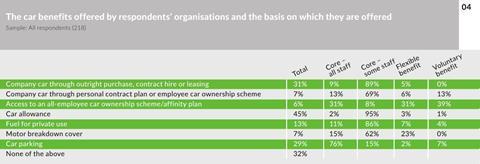
Need to know
- The government has said it is considering limiting the range of benefits available through a salary sacrifice arrangement.
- While providers are confident car schemes will not end up in the firing line, it is possible alternative models may need to be looked at.
- These could include affinity, employee car ownership or cash allowance schemes, or simply an employee being given the option of ‘paying’ for a car through a salary reduction.
It has been a year since former pensions minister Steve Webb suggested salary sacrifice as a benefits model might be vulnerable to a Treasury clampdown.
The government’s confirmation in the March 2016 Budget documentation that it is considering limiting the range of benefits that attract income tax and national insurance contribution (NIC) advantages when they are provided as part of salary sacrifice schemes was, therefore, not completely out of the blue.
But the fact the government indicated three forms of benefit, pension saving, childcare and health-related benefits such as bikes for work, would be unaffected by any changes did, by inference if nothing else, leave a question mark over all other schemes, including car salary sacrifice schemes.
Steve Herbert, head of benefits strategy at consultancy Jelf Employee Benefits, says: “That the Treasury outlined a fairly explicit list does, I think, appear to indicate anything else could be withdrawn. So I think it would be wrong to assume car salary sacrifice is safe, although I do think it is probably more likely to survive than some of the more weird and wonderful ones, such as, say, being able to sacrifice salary to buy a box of wine.”
Providers are, naturally, putting a brave face on things, with the British Vehicle Rental and Leasing Association (BVRLA), highlighting in a press statement in March 2016 that “any changes would impact on the estimated £4,500 that HMRC [HM Revenue and Customs] receives in tax revenue per year from each salary sacrifice car”.
Benefits of salary sacrifice
Providers have also been quick to point to the environmental benefits of car salary sacrifice schemes, given that they are most tax efficient for lower carbon dioxide (CO2)-emitting cars, and the fact they have moved employers away from relying on employees using grey fleet private cars for work. David Hosking, chief executive of Tusker, says: “Car salary sacrifice has replaced tens of thousands of high-polluting old bangers with safe, efficient, well-maintained and insured, low-polluting [cars].”
Matt Walters, head of consultancy services at Leaseplan, adds: “One of the attractions of salary sacrifice-based car schemes is that they have pushed company car usage out to a wider employee population base.”
Alternatives to salary sacrifice schemes
But were car salary sacrifice to go, or somehow be made much less attractive as an option, what might replace it? One area that could come back into favour, although it is more expensive for employers, is conventional cash allowance company car schemes, where an employee is given a pot of cash for a car or cash instead of a car.
Affinity-style schemes could also be a plausible alternative, says Guy Roberts, director of Novalease at SG Fleet. “One obvious alternative would be for an employer to offer a personal leasing scheme whereby the employee just leases the car themselves but can still benefit from special offers and the convenience of leasing,” he says.
There could also be renewed interest in employee car ownership (Eco) cash-for-car schemes, says Leaseplan's Walters. Under an Eco scheme, the employee owns rather than leases the car, through a credit sale agreement, and simply makes repayments directly from their salary.
“I think what might happen is schemes may just be renamed and remodelled as a perk,” says Tusker’s Hosking. He cites the example of an employee that currently sacrifices £300 a month towards a company car; if that is then scrapped, one solution would be for the employer to offer the employee the option to keep the car and reduce their salary by £3,600 a year.
“It’s clearly less attractive than doing it via salary sacrifice but it does still give the employee a choice,” explains Hosking. “Then, at the end of the term of the contract, the employee could be given the option of approaching the leasing company to buy the car outright or just enter into a new agreement with their employer.”
While the industry is quite confident that the government will not scrap car salary sacrifice schemes, employers can make sure they are fully prepared for any eventuality by exploring alternative provision methods.

University of Reading sees momentum grow around salary sacrifice car scheme
The University of Reading launched a salary sacrifice-based car leasing scheme called Mycar through Leasedrive (now combined with Zenith) back in June 2014.
The scheme has been something of a slow burn in terms of growth, with currently around 20 to 25 members, but is nevertheless seen as an important part of the university’s benefits mix.
Claire Eckett, HR manager, reward and benefits at the University of Reading, says: “We offer the scheme as a voluntary benefit and, as a university, we’ve not previously had a company car culture, so take-up has been slow but steady. We see it as part of a wider package of support for travel-related benefits, one that complements things nicely.”
While, no one actually knows what, if anything, will happen, a significant move by the government to limit or curtail salary sacrifice would almost certainly have ramifications for a scheme such as Reading’s.
“Salary sacrifice is the key element that makes it affordable for people. The reason we offer it through salary sacrifice is to have something better than simply buying a car privately through a local dealer, and that advantage would probably go," says Eckett. “Having said that, a lot of schemes do have a carbon dioxide (CO2) emissions cap; ours is set at 130g/km, so there is an environmental argument in terms of encouraging employees to be driving greener, less CO2-emitting [cars].
She adds: “What I would therefore hope and expect is that, even if the government did act, providers would be working very hard to put alternative schemes or scenarios in place that would still be attractive to employers, perhaps based around low CO2-emitting [cars].”












